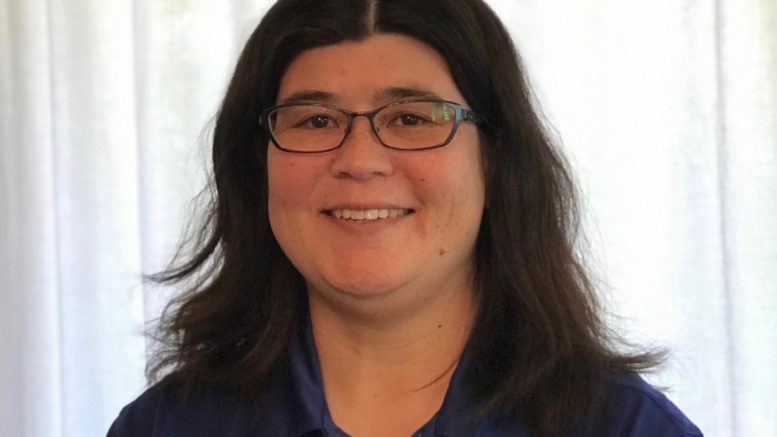By Alexander Musa
In 2021, Belinda ‘Bee’ Foster was recognized as Teacher of the Year for Twin Rivers Unified School District. It was a capstone in a career that spans much of her adult life. During a pandemic that most education systems never prepared for, Foster continued to serve her students. But the second year of upheaval would be the last year of life as Foster once knew it.
In 2022, Foster would join millions of Americans who were infected by COVID-19. While the lockdowns of 2020 are now a distant memory, and business as usual has resumed for many people, the pandemic is not over for her.
Foster, 46, is a COVID long-hauler.
“My students have no idea what they’re actually missing,” Foster said. “I know what version of me they’re missing and it’s really hard.”
The National Center for Health Statistics Household Pulse Survey in April 2024 determined that 17.6% of all U.S. adults in the United States claim to have experienced Long COVID symptoms.
The Department of Health and Human Services and the Center for Disease Control define Long COVID as symptoms of COVID-19, and related chronic health conditions, lasting anywhere from weeks and up to years after infection.
Long COVID remains a persistent threat. Some victims get over these post-infection symptoms in a matter of weeks. Then there are the Belinda Fosters of the world, whose battles against these conditions have extended years after their initial bout with the coronavirus.
One 2022 study from the Brookings Institution suggested that as many as 4 million Americans were out of work because of the persistent symptoms. At the most extreme estimates, roughly $230 billion is drained from the economy each year, even before factoring in the cost of additional medical care required by many Long COVID victims.
An extended battle
“I got it at the end of May 2022,” Foster said, “and I just didn’t get better.”
She had been vaccinated with the first wave of available inoculations as part of a program at Grant Union High School in 2021. But her infection came just before she’d been able to get a booster. She believes that her initial vaccination was enough to save her from even worse consequences.
Foster experienced a full gamut of symptoms, greatly amplifying existing challenges with autism and ADHD into a “sensory nightmare.”
“I got every weird symptom you could possibly get,” Foster recalled. “I would wake up and get in the middle of the night and I’d have some new, horrifying symptom.”
This included extreme fevers that peaked at 104 degrees, complications with her allergy-induced asthma, vicious migraines, and rashes all over her body, including in her mouth.
“My taste buds actually blistered and popped on my tongue,” Foster explained, resulting in the often-mentioned loss of taste many COVID survivors experienced.
Foster’s healthcare provider at the time was Kaiser Permanente, and protocol in these early days was that the symptoms would not qualify as Long COVID unless they had persisted for six or more weeks. Her doctors struggled to alleviate the symptoms; there were simply too many all at once. They placed Foster on a cocktail of medications to provide some relief, but the reverse happened instead.
“I ended up with serotonin syndrome and dementia-like symptoms,” Foster recalled. “I still get random rashes and fevers for no reason. It completely changed my auto-immune system.”
The health challenges persisted, including severe “brain fog”, a collective series of neurocognitive symptoms which greatly affected her short and long-term memory, as well as her ability to remain focused.
“I was having all kinds of trouble getting any kind of help from Kaiser,” Foster said. “They basically told me to just get used to it and maybe get a new job.”
Foster’s cognitive decline, coupled with the rest of her persistent Long COVID symptoms, reduced her typical workday by half. She suffered mental breakdowns, and had periods of time where she became non-verbal. She began carrying a device to help her communicate with students and co-workers.
Often, there were days she simply could not work at all. The school was accommodating, but she was running out of sick days to spend on this illness.
Before Foster switched to another healthcare provider out of frustration, Kaiser introduced her to a neurologist, who then recommended a speech therapist. Eventually, she was connected with Sacramento State University’s Department of Communication Sciences and Disorders.
No Easy Solutions

“The medical field in general is very much about medicine,” explains Dr. Elisabeth “Lisa” D’Angelo, 60, speech language pathologist and full-time associate professor at California State University-Sacramento. “They’re very quick to prescribe something. And sometimes we want that, sometimes we want ‘quick’. But most of the stuff that I work with doesn’t really respond to medicine very well, and they haven’t figured it out with Long COVID.”
The “Long Covid Cognitive-Communication Treatment Study” conducted by Dr. D’Angelo at Sac State is how she met Belinda Foster. The study focused on non-pharmaceutical therapy, similar to that employed in the treatment of mild traumatic brain injury victims.
Early results are promising, even with the small number of participants. Three volunteers underwent a cognitive-communication assessment over Zoom calls to establish the level of reduced cognitive function post-COVID. After the pilot cognitive-communication treatment study, the volunteers showed “significant improvements in attention, memory, executive functions in just 8 sessions of individual intervention. Additionally, participants reported improved cognitive-communication abilities.”
D’Angelo served on the nursing frontlines in Sacramento as the pandemic descended upon the United States. When vaccines became available and healthcare providers learned more about how to treat patients, she heard survivors begin to describe Long COVID symptoms after beating the initial infection.
“I had people telling me that they had brain fog,” D’Angelo remembered. In the worst cases, victims in the ICU were being sent for rehabilitation similar to “people with brain injuries or strokes, any kind of neurological injury.”
Many people who experience COVID recover within weeks of their infection. Even symptoms of Long COVID can, over time, fade away almost completely for many people. But there are many others like Belinda Foster who say they’ve spent years suffering from the aftershocks of their infection, struggling to find doctors willing or able to take their stories seriously.
“I had a lot of patients getting told ‘You have a lot of anxiety and depression, that’s what this is,’ before getting prescribed antidepressants,” D’Angelo said.
Such solutions are potentially dangerous for some Long COVID survivors, particularly from the perspective of COVID leading to brain injury. Changes in brain chemistry affect how antidepressants are metabolized, potentially resulting in harmful effects rather than helpful ones.
“It’s almost like they’re blaming the victim now, telling them it’s in their head,” the specialist added.
Trying to find help

People afflicted with Long COVID struggled from the very early days of the Pandemic to find doctors who believed the symptoms they were reporting. Even relatives of COVID long-haulers could prove to be a source of doubt or misinformation about the condition. Many turned to social media to find others who could sympathize or understand.
“All over the world, everyone says the same thing,” said Amanda Finley of Kansas City, Missouri. “It’s the sickest I’ve ever been. I don’t know what’s wrong with me. Nobody knows what’s wrong with me. I think I’m going crazy.”
Finley, bombastic at 60 in spite of her medical and economic circumstances, is one of the co-founders of the COVID-19 Long-Haulers Facebook page and its private discussion sub-group.
Originally infected during the earliest waves of COVID-19, Finley helped open the support group in June of that year. Since then, thousands of long-haulers have gathered in spaces like this for mutual support, advice on handling their new “normal,” and to also serve as a shield against the misinformation which has run rampant across the Internet.
“What really makes me mad is people playing on the desperation of long haulers,” Finley said.
She believes that social media companies are not only failing to contain misinformation, “they encourage it. Twitter is a prime example.”
Finley has taken on people like multi-millionaire tech entrepreneur Steve Kirsch. Kirsch famously offered a bounty for anyone who could cure COVID-19 during the early waves of the pandemic, and also funded trials for a variety of unproven treatments, according to reporting by Mother Jones.
According to Finley, one of the greatest challenges being faced by long-haulers are the socioeconomic consequences for falling so ill. She serves as a primary example of this, having lost her home in April 2024 due to being unable to make rent payments. Long COVID prevents her from maintaining gainful employment, so for the moment she lives in a tent at Weston Bend State Park.
Facing Long Covid Together

It is not the first time Finley’s circumstances led to homelessness, and she is not alone in her difficulties. The Facebook group is filled with stories of similar challenges, threats of possible homelessness, of deeply felt loss and desperation.
One member, Kerri Hill of South Carolina, writes that she has lost 29 members of her family to COVID. She has endured “3 lung surgeries, 2 heart surgeries, brain damage and more.” Hill canceled a longer interview due to an emergency hospital visit.
Michelle Lewis, 48, of Florida, said her Medicaid is set to end by April 30, which would effectively cut off access to the cocktail of 31 medications she takes to control her Long COVID symptoms.
“I now live in a camper in my daughter’s backyard because I just lost my home in January,” she said. “Long COVID affected my pancreas, so I have to take pancreatic enzymes every time I eat,” Lewis added. “It’s about $1,200 every two weeks, and that’s just one of my medications.”
Long COVID changed every aspect of Lewis’ life. As her symptoms grew into more complex ailments, pain was a familiar companion. She manages headaches and migraines with Tylenol and ibuprofen, but it isn’t enough to deal with the pain throughout her body. Doctors have tried to suggest opioids in a bid to provide more comfort, but she has so far refused.
“Everything I have is just going to get progressively worse as I get older,” Lewis said. “And once I go on opioids, I’m not going to be coming off of them.”
Complications with regularly scheduled phlebotomy treatments resulted in excessive bleeding, which also disrupted her menstrual cycle. Lewis’ ferritin levels collapsed to the point where she required iron infusions.
“It just felt like they were putting molten lava into my veins,” Lewis recalled. “It burns so badly and I just sat there and cried.”
She eventually faced two options: continue the treatments, or undergo a hysterectomy. She chose the latter.
“It’s not like I need it,” Lewis reflected, “but at the same time it’s still a pretty big thing, right?”
Once the owner of a landscaping business, Lewis spent much of her time outdoors as part of her job and when she wanted to relax. She hiked, swam, and went fishing when she wasn’t crafting jewelry by hand or painting rocks.
“Now I spend my days on my phone,” Lewis said, “with puzzle games that my neurologist suggested to try to help with my memory because I forget everything.”
She says her memory loss is so severe, and her short-term memory so poor, she has forgotten where she is in her own home.
Like many long-haulers, Lewis relies on emotional and financial assistance from others. Her busy schedule with doctor’s appointments, dealing with snowballing medical complications, and an expensive prescription regimen demands nothing less.
“I’m glad that I have a good support network of people who care about me, because sometimes you just wake up and you’re like, why am I even still here?” Lewis said. “What am I actually giving back to the world at this point?”
Moving Forward

Memory, and the lack of it, plagues Belinda Foster’s day-to-day life, and it has greatly affected her ability to teach students.
“I was forgetting where I was, why I was there, what was happening. I was getting really lost,” Foster said.
While the study under Dr. D’Angelo represented the only “real treatment I’ve had for Long COVID,” she says her improvements have somewhat plateaued. Foster can teach for a full day now; before the study she struggled to last half a school day.
Despite the improvements, there remain major challenges and accommodations she needs to perform at her best.
Large gatherings, such as assemblies, still represent sensory overload, so she is excused from attendance. Her prep hours have been moved to later in the day, to account for the fact her brain fog and cognitive function worsen during the last hours of school. She can leave a class if she is becoming overly stressed.
“My students have always been great, if there are days where I have trouble talking,” Foster acknowledged. “and I have to use my device instead, they’re accommodating of that.”
Her fellow teachers are also quick to provide aid if the students notice she needs assistance.
But Foster feels that the walls are closing in on her time as an educator.
“I live in fear of what happens if my admin stops being supportive, that they’re like, ‘Can’t do it. You’re not able to perform the functions of your job.’” Foster said. “I’ve never done anything else professionally. I don’t know what I would do.”


Be the first to comment on "Award-winning Sacramento teacher says she’s been fighting Long COVID since spring of 2022"